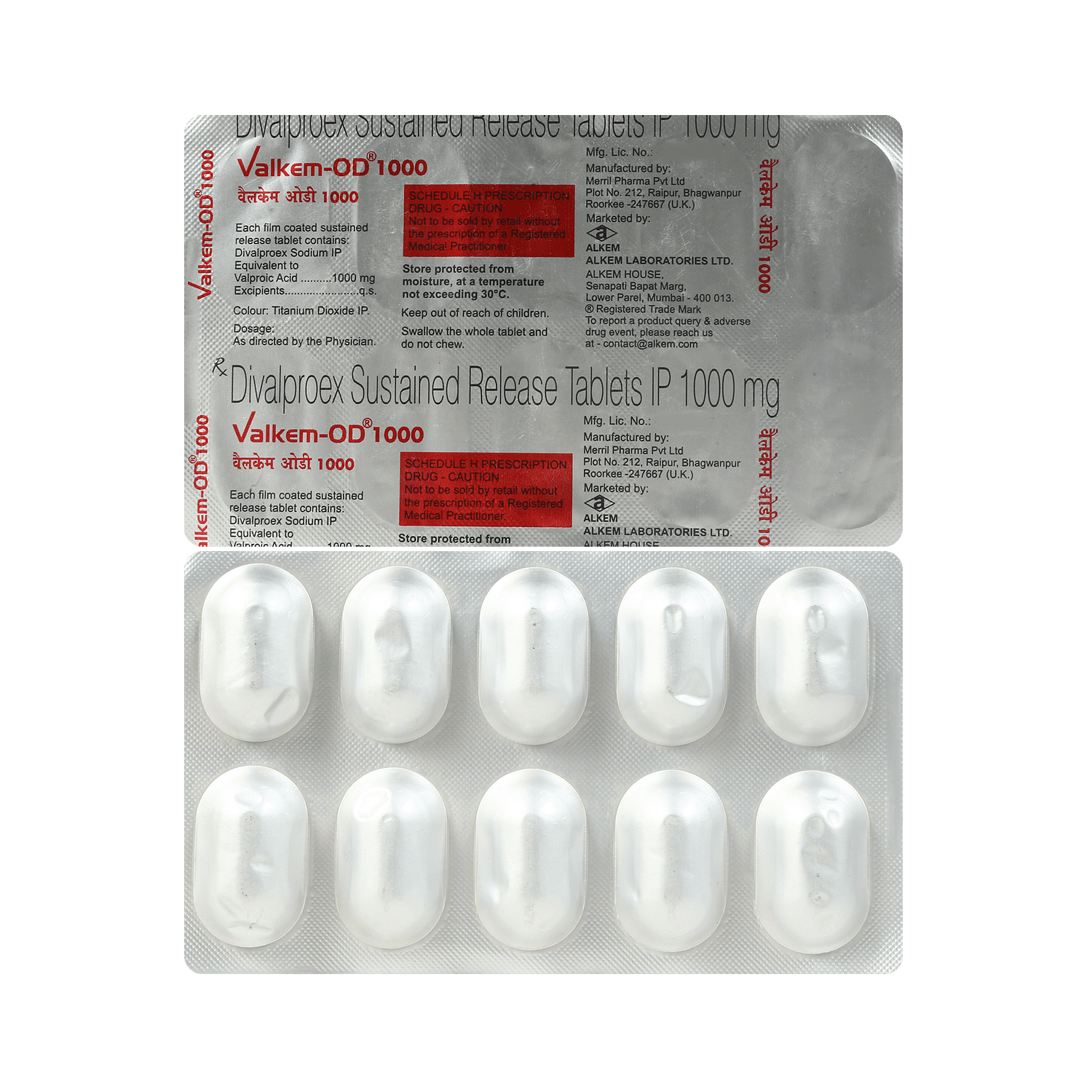
Valnate D 1000mg Tablet
Manufacturer
Shatayushi Healthcare Pvt Ltd
Salt Composition
Divalproex (1000mg)
Key Information
Short Description
Valnate D 1000mg Tablet is a medicine used to treat epilepsy, prevent and control seizures (fits), and prevent migraines. It may also be used to treat bipolar disorder.
Dosage Form
Tablet
Introduction
Valnate D 1000mg Tablet may be used alone or in combination with other medicines. The dose and how often you need to take it will be decided by your doctor so that you get the right amount to control your symptoms. You can take this medicine with or without food but take it at the same time each day to get the most benefit. It usually takes a couple of weeks to work. It is important to take this medicine regularly and for as long as you are advised even if you feel well. Missing doses may trigger seizures and if you stop your condition may get worse. It should never be stopped suddenly.
Directions for Use
Take this medicine in the dose and duration as advised by your doctor. Swallow it as a whole. Do not chew, crush or break it. Valnate D 1000mg Tablet may be taken with or without food but it is better to take it at a fixed time.
Safety Information
Side Effects
Headache Blurred vision Nausea Vomiting Dizziness Tiredness Unsteadiness Bruising Decreased body temperature
Alcohol Warning
Valnate D 1000mg Tablet may cause excessive drowsiness with alcohol.
Breastfeeding Warning
Valnate D 1000mg Tablet is safe to use during breastfeeding. Human studies suggest that the drug does not pass into the breastmilk in a significant amount and is not harmful to the baby.
Pregnancy Warning
Valnate D 1000mg Tablet is unsafe to use during pregnancy as there is definite evidence of risk to the developing baby. However, the doctor may rarely prescribe it in some life-threatening situations if the benefits are more than the potential risks. Please consult your doctor.
Interacting Medicines
Alprazolam Chlordiazepoxide Clobazam Clonazepam
How it works
Valnate D 1000mg Tablet is an antiepileptic medication. It controls seizures or fits by decreasing the abnormal and excessive activity of the nerve cells in the brain.
Quick Tips
Take your medication regularly as directed by your doctor as missing doses can trigger seizures. It can be taken with or without food but better to take with food to avoid stomach upset. Do not change the brand of your medicine and make sure that you have sufficient amount of medicine present with you. Some healthy tips to prevent seizures: Practice yoga every day, Get enough sleep at nighttime, Limit the use of screen time such as mobile/laptop, Take your medication on time, Monitor your weight during treatment with this medicine as it can cause weight gain.
Related Medicines

Divalprid-OD 1000mg Tablet

Disal OD 1000mg Tablet

Dixval OD 1000mg Tablet

Divalin OD 1000mg Tablet

Divakon 1000mg Tablet

Diprate OD 1000mg Tablet

Maxvalper 1000mg Tablet

Divox 1000mg Tablet

Valkem OD 1000mg Tablet

Divoces 1000mg Tablet
Frequently asked questions
What should I do if I stop taking Valnate D 1000mg Tablet?
Do not abruptly stop taking Valnate D 1000mg Tablet without consulting your doctor. Gradual reduction under medical supervision is recommended to minimize risks.
Is Valnate D 1000mg Tablet a mood stabilizer?
Yes, Valnate D 1000mg Tablet may be used as a mood stabilizer in patients experiencing rapid mood swings. It works by calming brain activity during these shifts.
Can Valnate D 1000mg Tablet cause weight gain?
Yes, Valnate D 1000mg Tablet can lead to weight gain due to increased hunger. Maintain a healthy diet and engage in regular exercise to manage this.
Does Valnate D 1000mg Tablet make me sleepy?
Yes, Valnate D 1000mg Tablet can cause drowsiness. Avoid driving or tasks requiring concentration until you understand its effect on you.
Can Valnate D 1000mg Tablet lead to hair loss?
Yes, Valnate D 1000mg Tablet may cause temporary hair loss. This usually resolves with time and dose adjustment. Consult your doctor if the hair loss is severe or persists.
Can Valnate D 1000mg Tablet damage my liver?
Yes, Valnate D 1000mg Tablet can potentially cause liver injury. This risk is higher during the initial six months of treatment. Monitor for symptoms such as nausea, vomiting, loss of appetite, dark urine, facial swelling, and jaundice. Consult your doctor for regular liver function tests.
Can I drink alcohol while taking Valnate D 1000mg Tablet?
Avoid alcohol consumption while on treatment with Valnate D 1000mg Tablet. Alcohol may increase drowsiness, dizziness, or lightheadedness.
What laboratory tests should I have before taking Valnate D 1000mg Tablet?
Your doctor may recommend blood tests, including complete blood count (CBC), platelet count, bleeding time, and coagulation tests. Liver function tests are also crucial to monitor liver health during the initial phase of treatment. These tests should be repeated periodically throughout the first six months.
What should I do if I experience abdominal pain, nausea, and anorexia?
Sudden onset of severe abdominal pain accompanied by nausea and vomiting warrants immediate medical attention. Contact your doctor as soon as possible for diagnosis and treatment.
How can I check for overdose of Valnate D 1000mg Tablet?
Overdose symptoms may include headaches, blurred vision, decreased reflexes, confusion, fatigue, weakness in muscles, seizures, loss of consciousness, behavioral changes, and breathing difficulties. Seek immediate medical help if you suspect an overdose.


